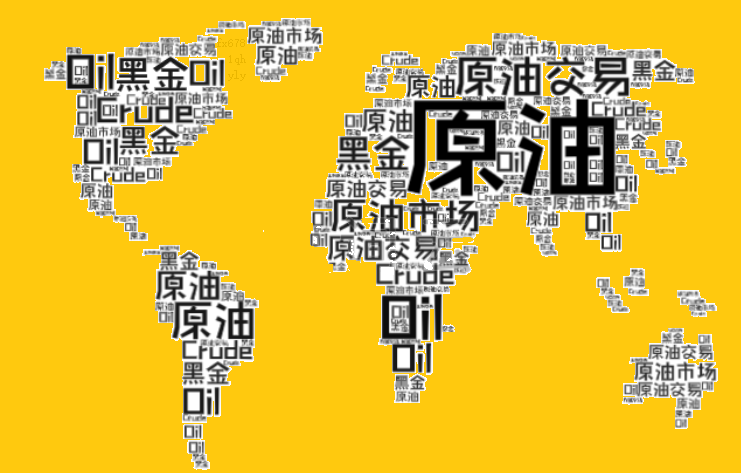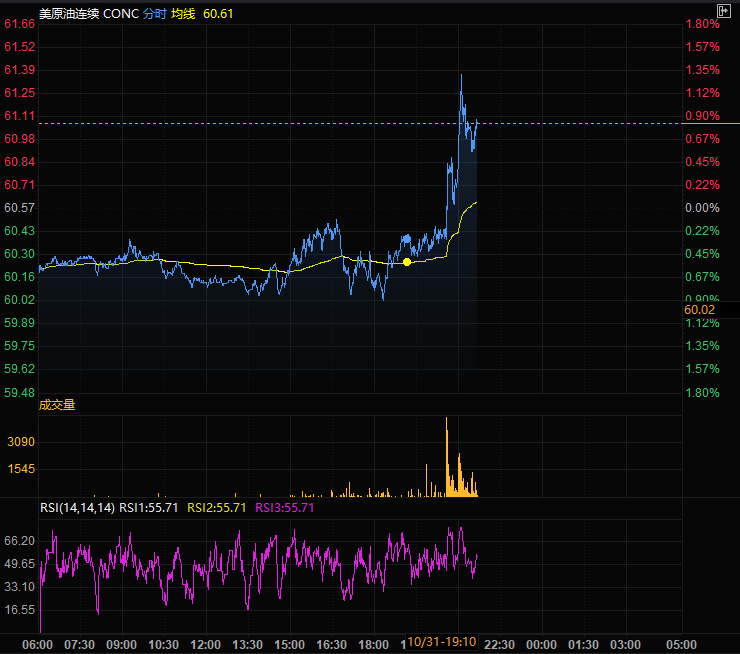The Caribbean Smoke: The Energy War and Global Market Turmoil Behind the US-Venezuela Conflict
2025-10-31 21:50:47
On one side, Venezuela possesses world-class oil reserves; on the other, the United States is making increasingly aggressive military deployments and political schemes. This game, spanning several years, from diplomatic probing to military deterrence, from the exchange of interests to the struggle for power, is profoundly rewriting the strategic landscape of Latin America.
The unexpected event raised concerns about international crude oil supply, with US crude oil prices rising by more than 1.5% at one point. Meanwhile, the gold market saw a surge in safe-haven funds, pushing gold prices up to $4,030 per ounce.

Turning point: A failed "energy-for-stability" agreement
The turning point in the story began with an unfulfilled diplomatic agreement. Grenell, a former U.S. ambassador to Germany and intelligence official, brought with him the Trump administration's signature "transactional" mindset and reached a core agreement with the Maduro regime: Venezuela would open its oil industry, allowing U.S. companies to participate in the development of its vast oil reserves, in exchange for Maduro's continued rule.
This plan once gave the market a glimmer of hope for easing tensions—if Venezuela, as a major global oil producer, were to successfully release its increased oil supply, it would directly reshape the global crude oil supply and demand landscape and inject stability into energy prices.
Francisco Monardi, director of the Latin American Energy Program at the Baker Institute, confirmed that the core objective of the agreement is to leverage access to Venezuela's oil resources, which aligns closely with the long-standing demands of U.S. energy companies.
Shift: From Interest Negotiation to a Radical Approach of "Regime Change"
However, this "trading interests for stability" deal was ultimately shattered by the US government's hardline shift, with Secretary of State Marco Rubio gradually replacing Gronell as the core leader of Venezuela policy.
Unlike Grenell's economic-first approach, Rubio's goal is more radical: to overthrow the regime that has been anti-American for decades.
His discontent focuses on two points: first, Maduro's close ties with Cuba, and second, his refusal to sever economic ties with countries like Russia, which are important partners in Venezuela's oil exports, directly hindering the United States' strategic layout in the Latin American energy and geopolitical fields.
More importantly, of the nearly 7.9 million Venezuelans who have left Venezuela, more than 700,000 have entered the United States. Immigration issues, along with energy issues, have become the core focus of the US-Venezuela rivalry.
Escalation: Diplomatic Closure and Frequent Military Pressure
The closure of diplomatic channels became a key factor in the rapid escalation of the situation. In just two months, from September to October 2025, the situation gradually became tense:
On September 2, Trump announced the first action against a Venezuelan vessel in the Caribbean, resulting in the deaths of 11 people;
In early October, he ordered Grenell to terminate all negotiations with the Venezuelan government, completely closing the channels of diplomatic communication.
On October 29, another maritime operation in the Eastern Pacific resulted in the deaths of four people. This marks the 14th such maritime operation launched by the United States off the coast of South America, with the frequency and intensity of military pressure continuing to escalate.
Deterrence: The largest regional military deployment in half a century
The scale of the US military deployment has set a regional record for half a century. Eight US warships are patrolling the waters around Venezuela, the USS Gerald R. Ford aircraft carrier is leading an escort strike group including cruisers and destroyers to support the Caribbean, approximately 10,000 US troops have been deployed, and multiple long-range bombers have approached Venezuelan airspace three times in two weeks.
In September, the U.S. military further escalated its efforts, deploying multiple advanced fighter jets and military drones to Puerto Rico, creating a comprehensive military deterrent. Experts assess that this force, with over 4,000 personnel and approximately 90 combat aircraft, is "insufficient to launch an invasion," but is capable of conducting precision long-range strikes. The targets it targets are mostly deeply intertwined with Venezuelan oil smuggling and black market foreign exchange networks.
Dilemma: Venezuela's declining defense and internal pressures
Faced with military deterrence from the United States, Venezuela's defense forces have long been weakened by economic hardship. Of its 22 Soviet-era Su-30 fighter jets, only 4 are operational; its 4 American-made F-16s are capable of flying but lack usable support systems; and most of its helicopters and transport aircraft have expired inspections and outdated equipment.
The root cause of all this is the shrinking oil exports, sharp decline in fiscal revenue, and depletion of maintenance funds caused by long-term US sanctions.
To make matters worse, Nobel Peace Prize laureate Machado explicitly welcomed foreign military intervention, and the opposition even drafted a transition plan for taking over the country, which included privatizing oil reserves and opening them to international companies—this not only provided a "moral pretext" for US military action but also fueled expectations of regime change.
Concerns: The "Hidden Dangers of Chaos" in Energy Companies and Venezuela's Oil Crisis
American energy companies are deeply concerned about the current situation. They worry that forcibly overthrowing the Maduro regime could trigger chaos in Venezuela, hindering its access to local oil resources and disrupting the global energy market's supply rhythm.
In fact, the US maritime control has already had a direct impact on Venezuela's oil industry—oil export revenue has dropped by another 12%, and coupled with the previous severe sanctions, this once major oil exporter has even fallen into a severe gasoline shortage, with vehicles queuing to refuel at gas stations stretching for more than 7 kilometers.
Ripples: Geopolitical conflicts impact global financial markets
The impact of this geopolitical conflict has already spread to global financial markets, with international crude oil and gold bearing the brunt: the large-scale deployment of the US military directly triggered fluctuations in international oil prices, and Venezuelan bonds fell by as much as 15%.
As an oil-producing country that exports 700,000 to 900,000 barrels of oil per day, any supply disruption from Venezuela could directly impact the global oil market balance. Coupled with the fact that this action was described as a follow-up to a previous specific operation and the continued escalation of regional tensions, the geopolitical risk premium was quickly reflected in oil prices, causing international oil prices to rise accordingly.
The arrival of the aircraft carrier battle group further embedded geopolitical risk premiums into energy futures prices. Although the global crude oil market is generally oversupplied, short-term geopolitical risks have still driven a significant upward movement in crude oil futures.

(US crude oil intraday chart, source: FX678)
Traders are closely monitoring developments and continuously assessing the actual impact of potential supply risks on the oil market's supply and demand balance, further highlighting the key disruption to the global energy market caused by political instability in major oil-producing regions.
The Future: Unending Games and Market Uncertainty
Now, Trump has repeatedly hinted at possible action against Venezuela, and the "window of opportunity" for geopolitical conflict coincides closely with the cyclical fluctuations in global financial markets.
Warships still patrol the Caribbean Sea, and the roar of fighter jet engines echoes over Latin America. This struggle over oil resources and geopolitical hegemony is far from over.
The potential US military action against Venezuela and the unprecedented scale of the USS Ford carrier strike group's deployment in the region have raised serious concerns about the stability of global oil supplies.
At the same time, the UN High Commissioner for Human Rights issued a statement urging the US to cease its military operations in the Caribbean and Pacific, noting that the US attacks on ships had caused casualties and the situation was escalating, characterizing such actions as "extrajudicial killings," emphasizing that they lacked justification under international law, and calling for a swift, independent, and transparent investigation.
This statement from the international community has not only heightened concerns about the legitimacy of military action, but also prompted the market to consider the persistence and subsequent evolution of geopolitical risks, further amplifying expectations of volatility in the current oil market.
At 21:37 Beijing time, US crude oil is currently trading at $61.03 per barrel.
- Risk Warning and Disclaimer
- The market involves risk, and trading may not be suitable for all investors. This article is for reference only and does not constitute personal investment advice, nor does it take into account certain users’ specific investment objectives, financial situation, or other needs. Any investment decisions made based on this information are at your own risk.





















